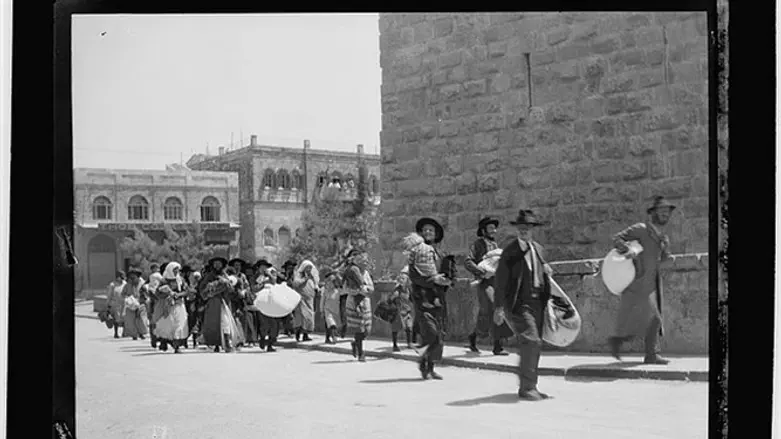
Faced with the Deal of the Century, we must look at the history of deal-making with the Palestinian Arabs.
Will they come to the table, or refuse to negotiate altogether?
The report by His Majesty’s Government in the United Kingdom of Great Britain and Northern Ireland to the Council of the League of Nations on the Administration of Palestine and the Palestine Royal Commission 1936-1937 testifies to the fact that there is no linkage between terrorism and “occupation” and the use of violence that required building security fences is not new.
Unfortunately, these are salient features on the landscape that repeat themselves due to the violence deeply embedded in Palestinian political culture. The only difference is that the ‘shoe is on the other foot’ in terms of ‘who is fenced in,’ the potential victims or the perpetrators.
The British report to the League of Nations noted Palestinian Arabs’ “refusal to negotiate.”

1937 report: "Attacks by Arabs on Jews, unhappily, are no new thing. The novelty in the present situation is attacks by Arabs on Arabs. For an Arab to be suspected of a lukewarm adherence to the nationalist cause is to invite a visit from a body of ‘gunmen.'" “The Arab leaders had refused to co-operate with us [British] in our search for a means of settling the [Arab-Jewish] dispute.”
“The Arab leaders had refused to co-operate with us [British] in our search for a means of settling the [Arab-Jewish] dispute.”
The British report to the League of Nations had no problem acknowledging the sustaining character of political violence in Palestinian Arab culture – internal and external, noting:
“The ugliest element in the picture remains to be noted. Arab nationalism in Palestine has not escaped infection with the foul disease which has so often defiled the cause of nationalism in other lands. Acts of ‘terrorism’ in various parts of the country have long been only too familiar reading in the newspapers. As in Ireland in the worst days after the War or in Bengal, intimidation at the point of a revolver has become a not infrequent feature of Arab politics. Attacks by Arabs on Jews, unhappily, are no new thing. The novelty in the present situation is attacks by Arabs on Arabs. For an Arab to be suspected of a lukewarm adherence to the nationalist cause is to invite a visit from a body of ‘gunmen.’”
The above Mandator’s report cites additional corroborative evidence:
“There were similar assaults [by the Arabs] on the persons and property of the Jews, conducted with the same reckless ferocity. Women and children were not spared. ... In 1936 this was still clearer. Jewish lives were taken and Jewish property destroyed. ... The word ‘disturbances’ gives a misleading impression of what happened. It was an open rebellion of the Palestinian Arabs, assisted by fellow Arabs from other countries, against British Mandatory rule. Throughout the strike the Arab press indulged in unrestrained invective against the [British] Government. The [British] Government imprisons and demolishes [houses] and imposes extortionate fines in the interests of imperialism.”
The British report to the League of Nations noted the hate that fueled Palestinian Arab political culture:
“… Palestine Arab nationalism is inextricably interwoven with antagonism to the Jews. ... That is why it is difficult to be an Arab patriot and not to hate the Jews”.
“…We [the British] find ourselves reluctantly convinced that no prospect of a lasting settlement can be founded on moderate Arab nationalism. At every successive crisis in the past that hope has been entertained. In each case it has proved illusory”].
The British report to the League of Nations noted the destructive role of Palestinian Arab leadership:
“If anything is said in public or done in daylight against the known desires of the Arab Higher Committee, it is the work not of a more moderate, but a more full-blooded nationalism than theirs.”
The record of Palestinian Arab leadership is bleak. Are we bound to repeat this history of rejectionism and violence, or is there hope for a new deal?
